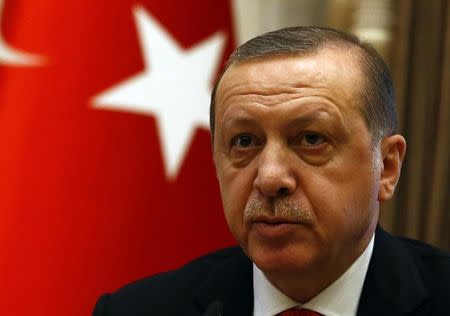German court upholds ban on poem mocking Turkey's Erdogan

BERLIN (Reuters) - A German court on Friday upheld an earlier ruling banning parts of a satirical poem that mocked Turkish President Tayyip Erdogan, a case that caused a diplomatic spat between Germany and Turkey and tested the limits of artistic freedom. The Hamburg court upheld its injunction issued in May banning re-publication of parts of the poem, which suggested the president engaged in bestiality and watched child pornography, which comedian Jan Boehmermann recited on television last March. The case soured already tense relations between Germany and Turkey at a time when the European Union was looking to Ankara for support in tackling the migrant crisis. The crux of the legal arguments centred on the right to artistic freedom with the personal rights of Erdogan, the court has said. In its May order, the court marked 18 of the poem's 24 verses as "abusive and defamatory" and banned them. "The court found that artistic freedom is unconditional but not unbounded," the court said in its ruling on Friday. "Satire that is secured under artistic freedom could be forbidden when it touches on the core area of personal freedom". However, explaining why some verses should be allowed, the court said freedom of expression remained paramount. "The court stresses that the plaintiff, as a head of state, must accept heavy criticism, as freedom of expression arises from the special need to criticize power," the court said, explaining its decision to allow re-publication of some verses. In October, prosecutors in the city of Mainz dropped a separate investigation into Boehmermann. Chancellor Angela Merkel had been widely criticised for allowing investigators to pursue the case against the comedian. The German cabinet last month agreed to rescind a section of the criminal code prohibiting insults against foreign leaders. The criminal code had required the government grant permission for prosecution in such cases. (Reporting by Joseph Nasr; editing by Richard Lough)

